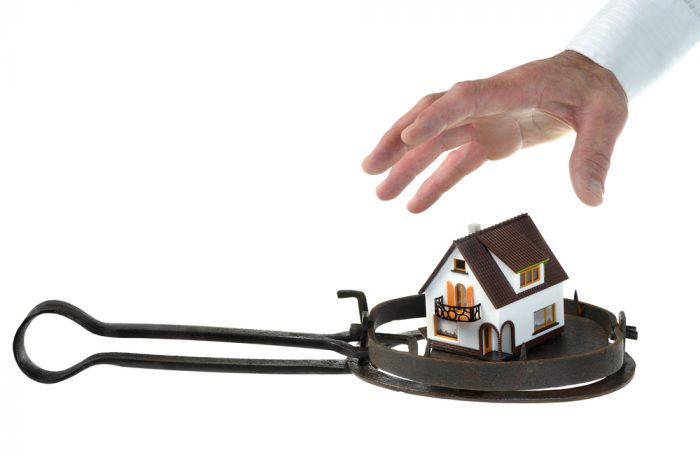Real estate scams are becoming more complex by the day. These tips will fill you in and help you out in order to avoid multiple types of property fraud and protect your clients.
Branding & Design Technology
Real estate fraud (otherwise known as property fraud) is a real and current concern for both real estate clients and the real estate agents who support them. Scammers become more savvy with the year and have been known to impersonate lenders, agents, title companies or even clients themselves.
Some of your clients may be new to the home-buying process or have entered retirement age. These groups are targeted most often because they are commonly unaware of the ways that scams occur and lack an understanding of the complexities of a real estate transaction.
Scams can be as blatant as reaching out to the buyer over the phone and aggressively pressuring them to make a move or as stealthy as hacking conversations to get access to sensitive information.
There are several sneaky ways scam artists can attack you and your clients (which we will get into shortly). However, the most obvious telltale signs of a real estate scam are the same across the board:
- They ask for money upfront and urgently
- Poor grammar, spelling, and language that isn’t typical of a real estate professional
- Requesting that the home buyer send money through unconventional or casual methods such as Venmo or CashApp
- Immediately making an all-cash offer or an offer drastically beyond fair market value
As a real estate professional, you are meant to provide safety and security to your clients. It’s extremely important that you prioritize fraud prevention and teach your clients how to protect themselves against real estate fraud and avoid real estate scams.
The Most Common Real Estate Scams
1. Wire Transfer Fraud
Wire Transfer fraud is by far the most common and insidious of all of the most popular real estate scams. It involves the transfer of a tornado of personal and financial information between several people across platforms and businesses. The number of transactions and the bulk of communication provide an abundance of chances for scammers to jump in and intercept communication seamlessly. This is called “phishing”. Scammers often create fraudulent emails, fake texts, and websites that look dangerously close to the real thing. For example, they may add or subtract a single digit from the intended receiver’s email and create a new one that is similar enough to trip clients up. Then, they wire money to themselves.
Anyone involved in a large transaction (including real estate professionals) should never send or facilitate the transfer of money without verifying instructions with a live person on the phone from a safe number that they have previously called and verified.
Be especially wary of any written request to change wiring instructions you already have.
2. Rental Scams
It’s not hard to find a rental scam online. Scammers post property rental ads on Craigslist or similar sites to lure in unsuspecting or desperate renters. These fake listings are often complete with fake photos and contact information. They’ll use elaborate excuses to stop renters from viewing the rental properties in advance or request that renters send a deposit without the proper documentation.
As a real estate professional, you know that it is crucial to do your due diligence when helping clients find a rental, especially if they’re doing it from afar. Make sure to verify the identity of the landlord and property in person. If you let your client pay any fees without this security, it will be on you.
3. The Cheque-Switch
The cheque-switch is similar to rental scams, however, they can be used with many different types of real estate purchases. The “buyer” will simply say that they accidentally sent you too much money and will ask you to transfer a chunk of it using a wire transfer, almost immediately after you have deposited the cheque. After a few days, the check will bounce and the “refund” that you sent them will be gone.
4. Moving Scams
Imagine this: your client fills out the necessary forms to request an estimate from a moving company. They receive an estimate for $3,000, but when the moving company has finished packing up all their things on the last day of their lease, they tell your client that it is actually going to cost $9,000.
In this case, it’s up to your client to do the majority of the work to hold the movers accountable. Advise them to get the moving company’s license number and see if any previous complaints have been logged with the Federal Motor Carrier Safety Administration in your country or Better Business Bureau (or a similar entity).
5. Praying on Foreclosures
The truth is that most homeowners facing foreclosure are at the end of their rope in terms of financial stress and time. This is a prime opportunity for scammers to claim to be a part of a government housing assistance program or something similar. These fraudsters know that homeowners dealing with hard times can become desperate and more willing than usual to skip over important details.
6. Foreclosure Fraud
Foreclosure fraud occurs when a property is wrongly foreclosed on, resulting in the homeowner moving out and giving up their home.
7. Loan Flipping
As experience has proven, loan flipping is almost always bad news. Loan flipping involves a lender encouraging a homeowner to refinance their home repeatedly, pushing homeowners to borrow more and more each time. Before they know it, homebuyers are paying off a loan pay bigger than they were prepared for. Seniors suffering from memory impairment are common targets for these types of scams.

8. Foreign Buyers/ Offers
The typical foreign buyer scams starts something like this. They explain that they are overseas, (usually in a country that is known to have wealthy property buyers such as China, Saudi Arabia, etc.) and won’t be back in the country until a certain date. Next, they insist that they need a place before arriving in the country.
The next step is usually sending you a bad check, asking you to cancel the transaction, but at least send them a partial refund, and then you find out that the cheque was bad and bounced anyway.
Not all foreign buyers are scammers, of course. Many legitimate foreign buyers buy homes remotely, however, they will typically have an agent they’ve hired to help them walk through houses on a video call and have face-to-face contact with the property owner.
9. Deed or Title Fraud
Scammers after your home title or deed are especially knowledgeable about the home buying/selling process, so watch out. These scammers will often steal client mail to obtain confidential info such as their full name, address, social security info etc.. With this info, they can forge signatures and other documents to assume the title for your property. It’s even possible that they try to take a loan out against your client’s home.
In some cases, organized crime groups have stolen identification and hired people to stand in as tenants in order to gain access to homes and even sell, rent them, or obtain a line of credit.
10. Sketchy Investors Unable to Provide References
Established, professional investors typically have a network of agents, contractors, and other investment professionals. If an investor making an offer on your property listing seems to be “winging it” without any references, your spider senses should spike up.
11. False Home Inspections
Typically, buyers pay for the home inspection unless another agreement is made. However, if a seller or someone else related to the sale of the home is pushing your clients to use a specific inspector, they may be trying to overcharge and pocket the money or convince you that the home has no issues (when there are in fact many).
The result is that expensive and essential repairs are missed or intentionally left out and the buyer doesn’t find out until it is too late.
If possible, research home inspectors thoroughly or connect your buyers with an inspector you can trust. Encourage your clients to always read reviews and only hire inspectors who are certified.
12. Disclosure Fraud
Most decent sellers inform buyers about known property damage. This can include leaky pipes, noise disturbances, and similar issues. The key word here is “known”. It’s unethical and in some cases, illegal, for a seller to conceal factors that would affect the property value of the home your client is purchasing.
If your client is a seller and not sure exactly what they need to disclose, encourage them to research local laws or contact a reliable real estate attorney for a second opinion.
13. Mortgage fraud
Mortgage fraud occurs when information and crucial data related to your mortgage is involved in fraudulent transactions. Simply put, scammers collect as much of a home owner’s personal information as possible, including the details of their financing deal, then they impersonate the mortgage owner at (or to) the lender’s office.
14. Real Estate Investment Education Scams
Some of your clients may be beginning to learn about real estate and find themselves interested in real estate as a long-term investment strategy. However, there are many get-rich-quick schemes that intentionally take advantage of new investors. After buying the expensive workshops, attendees don’t receive the education they expected or even the event details! Then, scammers convince “attendees” to pay for more advanced training at a higher price to get the true industry secrets.
Remind your clients that there are plenty of seminars seeking to take advantage of eager new investors. If anyone claims you’ll make a ton of money instantly with no experience – be wary.

15. Foreclosure Relief
After you’ve lost out on your home, you become a target for a “buyer “ who is actually a scammer. Real estate scammers who pray on those needing foreclosure relief will usually contact the person targeted and offer to modify their hefty loan or for an upfront fee. However, victims often end up paying extra fees for non-existent services and still have a stressful loan to manage.
How Agents Can Protect Their Clients and Themselves Against Real Estate Fraud
There are standard rules you should communicate with your clients before getting started with them in order to avoid serious issues down the line.
- Don’t be shy to sit your clients down and have an honest conversation about the risk of real estate fraud. Even if they are already informed, it’s better to make sure they are on the right page than to assume.
- If a client thinks they are being scammed or that their sensitive information is compromised, encourage them to reach out to you by phone or in person, immediately.
- Verify all money wiring instructions in real-time as your client completes the transfer. Stay on the phone with them or meet with them in person.
- Encourage clients to activate voice verification and any other extra types of identity verification on their bank accounts.
- Don’t reply or click into suspicious emails or texts. Opening these emails or texts could launch attacks and allow scammers to hack your accounts and devices to steal your precious info. clients should their agents you and their finance professionals immediately.
- Make sure your buyers are introduced to each real estate professional they’ll be working with along the way (title, appraisal, home inspection, escrow etc.) and give them the precise contact information for each person (even if they won’t be in contact with each of them regularly).
- Sudden changes in wiring instructions or banking info are definitely something to be wary of in the closing process. Tell clients to be on alert immediately if this happens.
- Showing that you are professional enough to do your due diligence and verify client information will impress them and keep all of you safe.
- Make sure that all parties involved in a transaction are consistently applying safe email and text practices.
- Be aware of AI. Today’s real estate scams are right on par with the most cutting-edge tech advances. Deepfakes can be created to impersonate agents, lenders or others and make them appear to say or do things that they didn’t. AI writing tools can also help to tidy up typical, messy scammer language. Stay on top of the latest cybersecurity threats and possibilities.
- If your client has been scammed, ask them to keep track of and save all communications between them and the scammer. This information can be used to help you find the scammer and build your case.
Wrapping Up…
Real estate scams are a real and growing threat in the real estate industry. Con artists are getting more savvy and scams become increasingly more complex alongside new technology. The good things is that if you stay educated and educate clients at the same time, you can avoid real estate scams completely.
If you want more in-depth articles, tactics, strategies, and advice – subscribe to our newsletter. And if you want to dominate your hyperlocal real estate market, check out AgentFire’s Web Designs, #1 rated for several years in a row.






